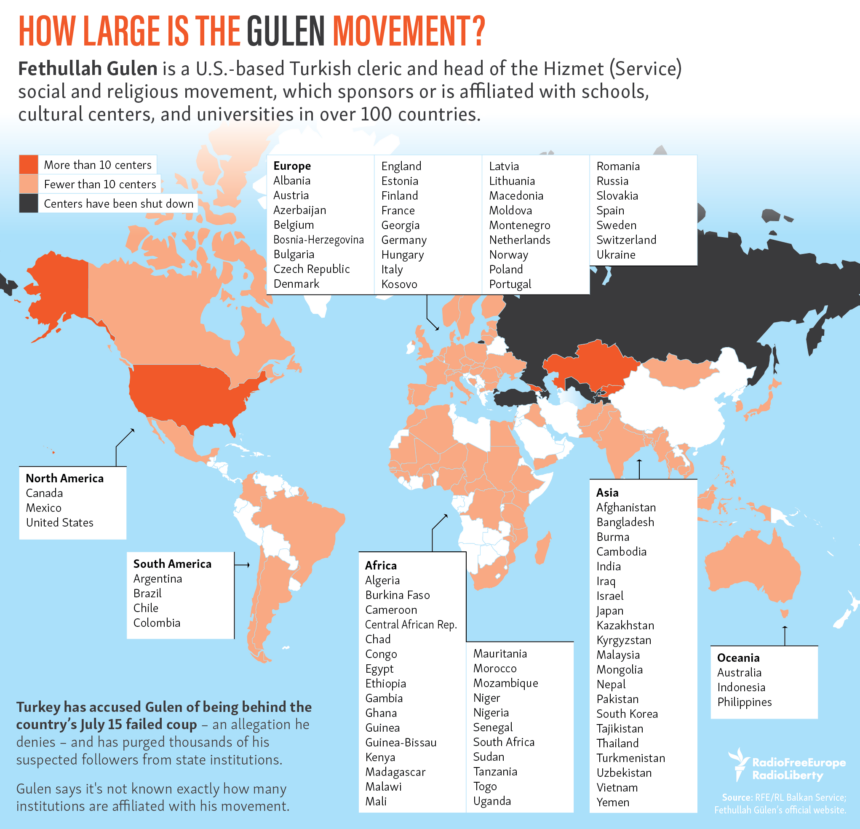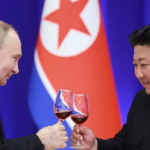The Gülen Movement, founded by Turkish cleric Fethullah Gülen, has long played a significant role in shaping Turkey’s domestic and international influence. Emerging during the Cold War, the movement was initially viewed as a bulwark against the spread of communism, gaining support from Western powers due to its alignment with pro-Western values such as education, modernization, and dialogue. As global geopolitical tensions evolve, particularly amid rising competition between major powers, the potential for a resurgence of the Gülen Movement as a key geopolitical actor warrants deeper exploration. The West, with its strategic interests in regions where the movement remains influential, could play a critical role in this resurgence
The Gülen Movement, once a cornerstone of Turkey’s soft power, was instrumental in shaping Turkey’s global influence through its vast network of schools, cultural institutions, and dialogue centres. It used to be active in over 160 countries; the movement fostered educational and diplomatic relationships that bolstered Turkey’s standing, particularly in Central Asia and Africa. Following the 2016 coup attempt, the Turkish government classified the movement as a terrorist group, enacting rigorous actions against its institutions both domestically and internationally. Nevertheless, the evolving geopolitical environment offers a unique opportunity for the West to counter the growing influence of authoritarian regimes like Russia and China by potentially revitalizing the Gülen Movement in strategically important regions.
Historical Context and the Movement’s Alignment with Western Interests
The Gülen Movement became a significant force in Turkey’s political and social domains by prioritizing education, civil society, and dialogue. During the Cold War, it operated as a moderate Islamic organization that opposed communism, aligning its values with those of the West. The movement’s promotion of science, technology, and ethical leadership aligned with Western principles of modernization and global integration, rendering it a significant asset for the West in fighting Soviet influence, especially in Turkey and other Muslim-majority nations.
The movement extended its influence beyond Turkey into important areas including Central Asia and Africa, where its network of educational and cultural institutions established it as a significant entity in soft power diplomacy. The movement cultivated generations of leaders aligned with Turkey and the West by providing high-quality education and promoting local leadership. The Gülen Movement thus emerged as a crucial component of Turkey’s “smart power” strategy, integrating soft power (cultural and educational influence) with indirect support for Turkey’s economic and political goals.
The Geopolitical Significance of the Movement: Central Asia and Africa
A key element of the Gülen Movement’s global presence is its vast educational network, which has demonstrated effectiveness as a crucial soft power instrument in geopolitically relevant areas. Central Asia exemplifies the possible significance of the movement in the resurgence of geopolitical prominence. After the collapse of the Soviet Union, countries in Central Asia sought to reform their education systems and modernize their societies. The Gülen-affiliated schools, emphasizing secular education, science, and technology, filled this gap. The movement’s influence in Central Asia allowed Turkey to counterbalance the growing presence of Russia and China, offering an alternative model of development aligned with Western values.
The West, particularly the United States and European nations, has always seen Central Asia as a pivotal area in the global power dynamics. As Russia endeavours to reestablish its dominance over the former Soviet republics and China advances its Belt and Road Initiative, the West’s necessity for soft power instruments to sustain influence in this region is increasingly pressing. The Gülen Movement’s restored network in Central Asia could serve as a crucial asset for the West. In this regard, providing an established infrastructure through which Western values of education, governance, and economic development could be promoted. Similarly, in Africa, the movement’s network of schools and civil society institutions has played a critical role in fostering ties between Turkey and African nations.
Africa, like Central Asia, is a region of increasing geopolitical competition, with powers like China, Russia, the U.S., and the European Union all seeking to expand their influence. The West’s engagement with Africa has often relied on soft power tools such as development aid, education, and cultural diplomacy. The movement’s educational institutions, renowned for their high standards, might serve as a conduit for the West to enhance its influence on the continent, especially amid escalating competition with China.
China’s Confucius Institutes and Russian Influence in Central Asia and Africa
China’s Confucius Institutes, which promote Chinese language, culture, and political ideology, have been expanding rapidly across both Central Asia and Africa. These organizations are essential to China’s global soft power strategy, particularly in regions where China is heavily investing in infrastructure and economic development through its Belt and Road Initiative (BRI). Simultaneously, Russia has utilized cultural diplomacy, historical ties, and educational exchanges to reassert its influence in its traditional sphere, especially in Central Asia.
These soft power methods seek to establish economic and political connections while also influencing the intellectual framework to favour authoritarian governing paradigms. China, via its Confucius Institutes, promotes a narrative of stability, progress, and order under a centralized framework, whereas Russia aims to sustain its hegemony over post-Soviet countries in Central Asia.
Russia’s Comeback in Africa
Russia’s modern-day engagement with Africa can be traced back to the early 2000s when Vladimir Putin sought to restore Russia’s global influence after the collapse of the Soviet Union. During the 1990s, Russia’s domestic challenges pushed Africa out of its foreign policy priorities, allowing other global actors, such as China, to gain significant influence across the continent. However, by the early 2000s, Moscow began its discreet return to Africa, ramping up engagement in recent years to revive its Soviet-era ties and influence. The Soviet Union had a robust presence in Africa during the Cold War, supporting numerous liberation movements and offering education and military training to African leaders.
Currently, Russia aims to revive such influence, though employing a different set of strategies. Although military and economic influence are vital to Russia’s strategy, soft power—albeit less conventional than that of the West or China—has emerged as a crucial element of Russia’s approach.
In other words, Russia’s soft power is differentiated from more recognizable Western cultural mediums, such as film, music, and fashion, or China’s Confucius Institutes, which emphasize linguistic and cultural interchange. Russia’s soft power in Africa is founded on political beliefs, historical connections, and a perception of autonomy from Western hegemony.
The Gülen Movement’s Role as a Counterbalance
The Gülen Movement offers an alternative model of educational diplomacy, one grounded in promoting modern education, ethical leadership, and intercultural dialogue. In Central Asia, the movement’s schools have been a vital part of the region’s post-Soviet educational infrastructure, providing an alternative to Russian-dominated curricula while fostering pro-Western and Turkish cultural values. The schools emphasize science, technology, and entrepreneurship, which align with the aspirations of these countries to modernize and diversify their economies.
This educational model not only promotes individual success but also encourages governance models rooted in civil society, ethical leadership, and democratic principles. In contrast to the Confucius Institutes, which are often viewed as instruments of Chinese political influence, the Gülen schools are perceived as fostering independent thinking and leadership, qualities that could make graduates more inclined to support democratic governance and align their countries with Western ideals. In Africa, the situation is similar. China’s Confucius Institutes have been proliferating alongside Chinese investment in infrastructure, natural resources, and development projects. However, the Gülen Movement’s schools offer African nations a different form of engagement—one that emphasizes self-reliance, education, and ethical leadership. Numerous African countries seek to counterbalance China’s expanding influence, and the Gülen-affiliated institutions offer a venue for cultivating future leaders who may be more predisposed to interact with the West and Turkey rather than only with China or Russia.
The West’s Strategic Interest in a Resurgence of the Gülen Movement
As Central Asia and Africa emerge as crucial arenas for global power rivalry, the capacity to influence the forthcoming generation of leaders and thinkers will be essential. The West, recognizing this dynamic, could leverage the Gülen Movement’s existing networks to counterbalance Chinese and Russian soft power.
Given the movement’s global infrastructure and soft power potential, the West stands to benefit from a resurgence of the Gülen Movement, particularly in regions where Western influence is under threat. In both Central Asia and Africa, the movement has cultivated strong relationships with local communities, governments, and elites through its educational institutions. These connections have helped shape positive perceptions of Turkey and, by extension, the Western values with which the movement is often associated. As global tensions rise, particularly in light of increased competition between the U.S., China, and Russia, the West may find it advantageous to re-engage with the Gülen Movement’s global network. Central Asia, due to its strategic proximity to both Russia and China, serves as a pivotal arena for influence. The West’s capacity to exert influence in this region is progressively limited by Russia’s military presence and China’s economic investments. The Gülen Movement’s educational institutions and civil society entities, which have influenced local leadership and promoted pro-Turkish and pro-Western attitudes, may offer a significant opportunity for the West to sustain its presence in the region via soft power.
In Africa, where China has significantly expanded its footprint through Confucius Institutes, infrastructure projects, and investments, the West’s necessity to enhance its influence is as pressing. The Gülen-affiliated institutions, which offer a modern educational framework focused on ethical leadership, business, and science, may be employed by the West as part of its broader strategy to counteract Chinese influence. Graduates of these schools, many of whom later assumed significant positions in their countries, may act as informal representatives of Western ideals, aiding in the development of Africa’s political and economic structures in accordance with Western objectives.
The West, especially the United States and European countries, has a strategic interest in mitigating the influence of authoritarian regimes in Central Asia, Africa, and other globally significant areas. As China enhances its soft power via Confucius Institutes and Belt and Road Initiative investments and Russia reestablishes its position through cultural diplomacy and economic leverage, the West necessitates alternatives to sustain and augment its influence.
Overcoming Challenges and Navigating Turkey-West Relations
The Gülen Movement’s potential for a comeback has strategic advantages; however, substantial challenges exist, especially regarding relations with Turkey. The Turkish government has worked tirelessly to dismantle the movement’s global network, pressuring foreign governments to shut down Gülen-affiliated institutions. Supporting the movement openly would likely strain relations with Ankara, which remains an important NATO ally and a critical geopolitical player.
To navigate this challenge, the West could adopt a more indirect approach, focusing on the movement’s educational and cultural values rather than its political elements. By promoting education, modernization, and intercultural dialogue, Western nations can discreetly support the movement’s infrastructure in regions where it aligns with broader strategic interests. Additionally, as Turkey’s political landscape evolves post-Erdoğan, there may be opportunities for the Gülen Movement to re-enter Turkey’s civil society and educational system, especially if a future government recognizes the movement’s geopolitical value.
Final Assessment
The resurgence of the Gülen Movement, with support from the West, could serve as an important geopolitical actor amid rising global tensions. Its extensive network of schools, cultural institutions, and civil society organizations offers the West a powerful mechanism to counter the influence of authoritarian powers like Russia and China, particularly in Central Asia and Africa. By promoting education, ethical leadership, and intercultural communication, the movement fits with the West’s strategic objectives, presenting a distinctive potential to reaffirm influence in areas of escalating geopolitical rivalry.
Through meticulous and strategic engagement, the West may utilize the movement’s infrastructure to further its soft power goals, fighting the ascendance of authoritarianism and fostering democratic governance, modernization, and civil society development in key global regions.
Photo credit: RFE/RL
By: GEOPOLIST Editorial Team







